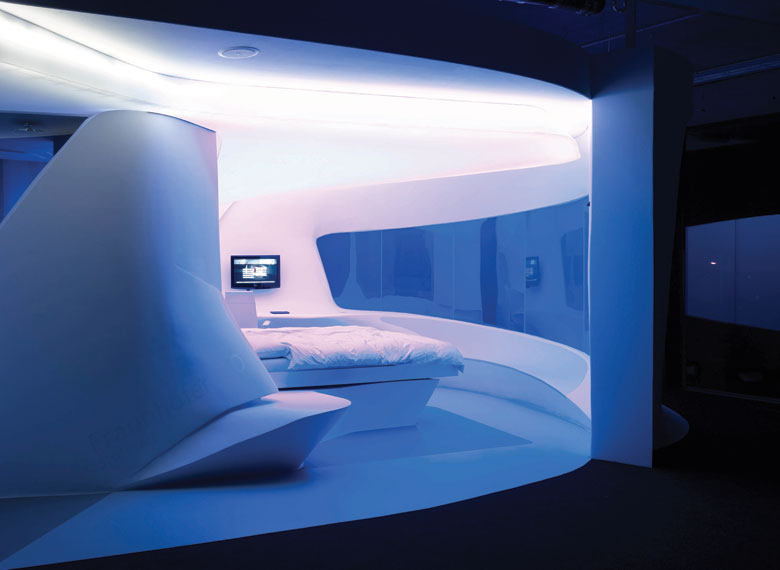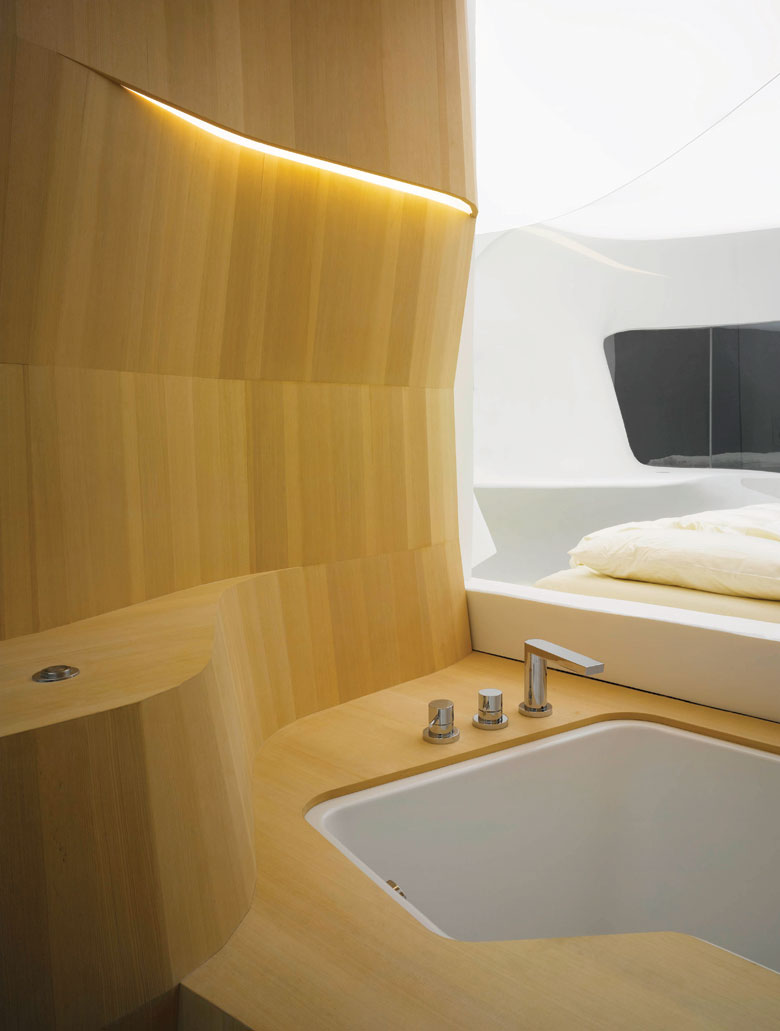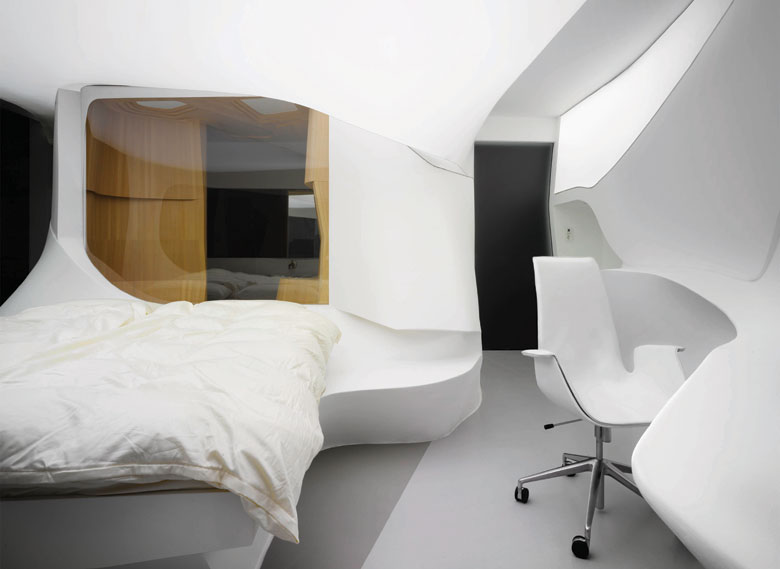Virtual décor and a bed that rocks you to sleep? Tomorrow’s technology is not as implausible as you may think, says Felicity Cousins
At last year’s Sydney Hotel Hospitality and Design Expo, there was a session on the hotel room of the future. Designs included ergonomic massaging beds, self-cleaning bath tiles and smartphone room entry.
All of this seems technologically feasible – after all, we have just sent a robot into space to explore the surface of Mars and transmit live footage back to Earth. But what if we fast-forward to 20, 30 or even 40 years’ time? What will our hotel rooms look like then, and what gadgets will be inside them?

Advances in technology will no doubt guide the direction of room design, but are there clues to tomorrow’s hotel room in our past? Patrick Goff, editor of hoteldesigns.net, who was a hotel designer for 20 years, says changes are driven by society: “One thing about hotel design that has been constant in the 40 years I have been in this sector is the aspirational aspect of staying in a hotel. Hotels always try to be a standard above what guests have at home.”
Room layouts haven’t changed dramatically over the years. They vary in size according to how much you are willing to pay, and which city you are in, but most are cuboid-shaped with a bed, desk and TV, an en suite bathroom, a built-in wardrobe and a minibar.
Larry Traxler, senior vice-president for global design at Hilton Worldwide, explains that it is our behaviour that influences how rooms are drawn up: “The biggest change I’ve seen in the guestroom has come about by the way people use it. Every room has the same basic components but people work differently now – people can use the lobby as a third space or work in restaurants or on the sofa, and all this affects the design.”
Sometimes the drive for cutting-edge design can wipe out any sense of function. How many of you have slipped into your hotel bed after a long day only to realise that the switch by your head only turns off the reading lamp? Stomping around the minimalist room searching for the elusive master light switch, wildly flicking lights on and off like an obsessive compulsive isn’t conducive to a good night’s sleep. Neither is being attacked by a toilet in Tokyo in the middle of the night – the warm welcoming seat a wicked ruse before the water jets take fire. Will tomorrow’s hotel room be more about what the guest needs than what the designer wants?
The Jumeirah Group asked delegates at the TEDx Dubai 2011 event what they wanted to see in the hotel room of the future. Their thoughts were then drawn by artist Zanjeer Salam. Ideas included virtual personal assistants and robots. People also wanted to see underwater hotel rooms, which are in fact already a reality – the Conrad Maldives Rangali Island has a submerged restaurant and honeymoon suite, and there are several projects in development for entire underwater properties, including Dubai’s Water Discus hotel.

Paul Priestman, founding director of design group Priestmangoode, says many of the features that will grace hotel rooms in the coming decades have already been invented: “The flatscreen TV was in the business arena for many years before it was introduced into hotel rooms,” he says. “We’ll see more remote control technology in the future.”
Priestman cites Nest – a “learning” thermostat that uses intelligent algorithms to learn personal habits, meaning room temperature will be exactly as each guest wants it rather than them having to keep adjusting the air conditioning. “It’s this joined-up type of interactive technology that we’ll be seeing more of,” he says.
Another example of this is in the bathroom. Hotel guests spend about two-thirds of their waking time in the bathroom so it has always been a key element for designers. Tim Mutton, chief executive of hospitality designers Black Sheep, says bathrooms will interact with the person using them, so light, temperature and scent will all adjust according to individual preferences.
“The bathroom is becoming more like a spa experience rather than a functional element,” he says. “The bathroom of the future will have your own personal scented products.”

Sustainability will also drive design in the bathroom. Finding the right temperature on the hotel shower often means using a lot of water, so Priestmangoode has designed digital shower controllers that can be pre-set to your ideal temperature, allowing you to start your shower without running your hand under the water for ages to gauge when it is hot enough.
Priestman says: “The idea is that saving energy has to make life easier for people, otherwise they won’t do it.” Mutton adds: “The hotel of the future will regulate the amount of water used and we will be conscious about what we are using. Room rates might even be adjusted to how much power is used.”
Ian Pearson, futurologist for technology, marketing and strategy consultancy Futurizon, says materials used in rooms will change dramatically. “We are already overtaking nature on the material side of things – cotton is a huge pollutant to produce and clean, but we will see self-cleaning using nanotechnology,” he says.
Materials with this technology have nanoparticles that eliminate tiny scratches or fissures, creating an ultra-smooth surface that repels water, grease and bacteria. Still, this probably wouldn’t compensate for the freshly laundered smell that makes getting into a hotel bed so appealing.

Priestman says such technology is already here: “There are self-cleaning bath tiles and ‘shake’ self-cleaning materials – so you could just shake the bedsheets and they would be clean”. Pearson adds that this “intelligent technology” also means we will see materials changing colour according to mood “or bedding that wicks away moisture or changes temperature”.
Mutton goes a step further: “Materials will replenish themselves and look better – hotels can take four years to build so they need to last and have materials that can adjust to their surroundings,” he says.
What about other technology in the room – with many travellers now carrying their own devices such as tablets and e-readers, what will be the future of in-room entertainment, for example? Hilton’s Traxler says: “Technology has already affected room design – big block TVs are now flatscreen. So what takes the place of the flatscreen TV? It might be the wall, or the entire surface of the room.”
Pearson suggests something far more revolutionary – that hotel guests in 50 years’ time might be wearing high-resolution augmented reality contact lenses so they can create their own entertainment. “Once you have a display like that [through the lenses], you don’t need anything else,” he says. “There will be no need for iPads, Kindles or TVs.”
Augmented reality – a computer-generated reality – means people can walk around in a virtual world that appears real. During the Olympics, the Holiday Inn Kensington Forum unveiled “the world’s first augmented reality hotel”. Guests used smartphones and tablets to see London 2012 Olympic and Paralympic athletes in virtual action in the public areas and bedrooms.
All this could mean that if you want to see Renoir paintings on the wall of your room, you could, or if you are staying in a budget hotel you could have the plush décor of the Ritz. Pearson says: “At the moment you go to a hotel room and it is the same for every guest, but with augmented reality it doesn’t have to be.”

Such ideas feature strongly in his Travelodge Future of Sleep report, compiled for the chain last year. Possibilities for the hotel room of 2030 include projecting images of your favourite beach on to walls and furniture – accompanied by the sound of the ocean via audio panels built into the windows – or shopping from your room with the walls replicating store interiors.
Still, augmented reality can’t take the place of tangible luxuries, and Pearson concedes that a white box as a hotel room may not be the future desire of everyone, as “there will always be some people who want the real stuff”.
Apart from five-star facilities, top-end hotels have always been about service. So who will cater to our needs in the future? Mutton says: “You may have robots to clean the rooms but I think hospitality is always best when it comes with a human smile – the luxury level is all about service and can you fully rely on robots? You cannot replace conversation.”
Pearson agrees: “As everything becomes more automated, human beings will become more valuable. Some people may even pay extra to be served by a human.”The future is here
The Laboratory for Visionary Architecture (LAVA) has offices in Germany, Abu Dhabi, Singapore and Australia and its creative team explores “frontiers that merge future technologies with the patterns of organisation found in nature”, believing this will result in “a smarter, friendlier, more socially and environmentally responsible future”.
LAVA’s designs incorporate intelligent systems and “skins that can react to external influences such as air pressure, temperature, humidity, solar radiation and pollution”. It designs everything from urban centres, such as the futuristic Masdar City centre in Abu Dhabi (see “Masdar inspires”), to homes made out of PET bottles, and hotels, houses and airports of the future. LAVA’s working prototype of a future hotel room looked at “the interfaces between architecture, technology and the human body”. The room is womb-like, rounded and features curved surfaces (circles apparently make people relax), anti-jet-lag lights, interactive ceiling lighting (you can choose your mood from a rainbow of colours) and a bed that rocks you to sleep. The bathroom has a reactive mirror that lights up when you look into it and the bath has heated sides. The windows turn into an opaque entertainment screen at the click of your fingers, and the TV is a talking computer.







